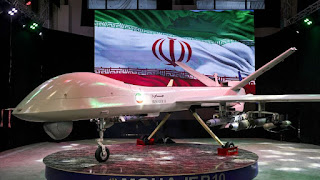Books need to be written. Seminar
and webinars need to be had. There is much information to share, and blogs and
short notes cannot do justice but merely wet the appetite of the reader for more.
So, what do you make of the drone and missile strike by Iran on Israel?
There are two plausible explanations
for believing that the strikes were a success. Firstly, that much damage was
done in Israel, occupied Palestine in truth, but the Israelis, of course will
not admit to it. The second argument to support the view for the success, is
that the strike showed two things. One is that Iran has capabilities to cause
damage in the occupied territories and, with that, was to observe and ascertain
the capabilities of the Israelis to intercept and combat the incoming missiles
and drones. The additional point to this is that Iran possesses more potent
missiles, if not nuclear capability. Both these arguments speak volumes for
Iran and no doubt their supporters will be excited while the detractors and enemies
will be wary. However, there is a need to clarify one point seeing that a
genocide is happening in Palestine. That point is that Iran’s attack was merely
a retaliation for the bombing of the consulate and consequent death of Iranians
in Syria. Their missile and drone attack had nothing to do with the people of
Palestine, nor with the protection of Masjid-al-Aqsa. Certainly, there are some
games at play. Is Iran complicit and party to these games, or is Israel goading
them to cause some instability in the region and set the world up for a major
war? This can be a long story and it really needs to be unpacked. Time and
space are against us at this moment but discussions need to be had and a real
understanding must be developed, instead of dismissing the next paragraph.
Iran was not always a Shia country.
Iran was Sunni for almost a thousand years until the late 16th
century when Shah Ismail I conquered Iran and forced the inhabitants to convert
to Shiism. Shiism, in short, refers to those who claim that Ali Bin Talib ought
to have been the first imam, caliph and, as such, accept him to be the first
caliph, thus disregarding Abu Bakr, Umar and Uthman. While this was merely
political at the outset, matters changed later on. One person that is credited
with this change is Abd Allah ibn Sabaʾ, a Yemeni Jew who reverted to Islam. He
accepted Islam during the reign of Uthman (Allah be pleased with him) and had
great love for Ali bin Talib. He asserted the exaltation of Ali, his divine
appointment and the introduction of the concept of the Imams (the Shi’a twelvers
follow twelve imams from the lineage of Ali). The Jewish influence lingers and
is considered the foundation of Shiism. This begs the question whether they are
open (real) enemies of the Jews. The further question, without their practice
of taqiyyah, is whether they attach any importance to Masjid-al-Aqsa. Answering
the latter question in the negative will actually then question the real motive
of the Iranians and whether they are trustworthy. You can actually study more,
in depth, about Shiism which ought to show you that there is no use defending
them, nor is there any benefit it seeking help from them.
Questions: And what is Taqiyyah? Who deserted Imam Hussein at
Karbala? What are the holiest site for the Shia?
Abu Bakr, Umar, Uthman and Ali (Allah be please with them) were the four
rightly guided caliphs.
You need to also read, share and
comment on these links below:
https://capemuslimspeak.blogspot.com/2024/04/the-other-side-of-open-door.html
https://capemuslimspeak.blogspot.com/2024/04/activating-self-destruct-key.html
https://capemuslimspeak.blogspot.com/2024/04/the-march-to-holy-land.html
https://capemuslimspeak.blogspot.com/2024/03/bold-question.html
https://capemuslimspeak.blogspot.com/2024/03/ar-you-reading-from-wrong-script.html
https://capemuslimspeak.blogspot.com/2024/02/wars-and-scores.html
https://capemuslimspeak.blogspot.com/2024/02/red-heifer.html







